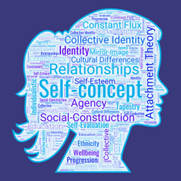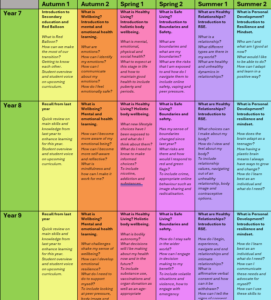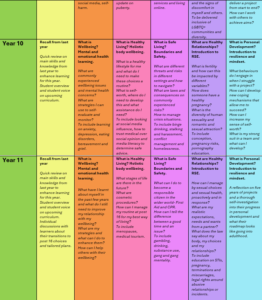RSE and PSHE
What does it stand for?
PSHE: Personal, Social, Health and Economic Education
RSE: Relationships and Sex Education

Our aims:
At RBET – Norfolk, our curriculum includes Relationships and Sex Education and Health Education across all phases. It provides our young people with the personal and social skills they need to enable them to grow up ‘Happy, Healthy and Safe, ‘celebrating their successes, maintaining different types of relationships and supporting them in gaining the skills to navigate life after RBET.
At RBET – Norfolk, we have taken the decision to rename this curriculum area as ‘Personal Development’ (PD) as we feel this is less daunting for our learners and incorporates both PSHE, RSE and spiritual, moral, social and cultural development.
Intent:
At RBET – Norfolk, we want our learners to grow into confident, independent and fulfilled young adults who feel happy, healthy and safe in their wider communities. Our goal is to support each student in developing the skills, resilience and self-belief they need to successfully transition into the next phase of their lives. We also recognise that many of our learners face challenges and we are committed to providing the individualised support and guidance they need to engage with learning in order to navigate the world around them. The aims of our PD curriculum are to support our young people to:
- Be able to communicate and interact effectively with others
- Understand their bodies and emotions and how to promote their physical and mental wellbeing
- Form and sustain positive, healthy relationships and recognise when a relationship is not healthy and where they can seek support
At RBET – Norfolk, learners undertake accredited ASDAN courses in Careers and Citizenship as well as the TITAN Ready to go and Foundation programmes. These provide real-life scenarios, discussion points and challenges in which to apply knowledge and skills in practical ways.
Long-Term Curriculum Plan


Implementation
At RBET – Norfolk, we strive for a bespoke curriculum for all learners. This means PD is taught in a variety of ways and teaching mentors will use a range of strategies to cover the curriculum. Our long-term plan provides an overview of the content to be covered for each year group within a rolling programme suited to each Key Stage. Due to the bespoke curriculum at RBET – Norfolk, the long-term plan may vary slightly in action due to the dynamic nature of PD here.
Coverage of the curriculum will be age and stage-appropriate for all learners; this is essential to understanding that not every learner will cover everything. PD allows tailoring to meet the very individual needs of our learners and repetition of key elements is important to support the development of being happy, healthy and safe.
The most effective PSHE teaching model is one that is sequenced and spiral in nature that builds on prior learning as pupils progress through RBET – Norfolk.
At RBET – Norfolk, teaching happens through three main routes:
- Continuous provision – these are the elements of PSHE which occur daily within each individual class routines e.g. – personal care, lunchtime routines or when using technology within different lessons.
- Discrete lessons – Government guidance recommends students have one hour a week to cover the PSHE curriculum and all of our learners have at least one session a week timetabled. When covering RSE content due to the needs of our learners, we cover learning through discrete professional conversations to ease uncomfortable feelings.
- Bespoke sessions – These are sessions which are tailored to suit individuals or very small groups of students as appropriate to their needs e.g. specific on-line safety related to social media.
Alongside these three main routes, we also have special focus days, community visits, external careers advisors and visitors that come into the centre to enhance and support the coverage as appropriate throughout the academic year.
For further details, please see the link below to our policy.
RSE content for each stage:
Group 1
What are Healthy Relationships? How to be safe and healthy.
Group 2
What are Healthy Relationships? What are feelings and how to manage them? My body and my health.
Group 3
What are Healthy Relationships? What is mental and emotional wellbeing? My body, risks and awareness.
Group 4
How to create and maintain healthy relationships. How to create emotional resilience and recovery. How to engage in healthy choices.
Group 5
Awareness, risks and choices in healthy relationships. Mental and emotional wellbeing and transitioning to adulthood. Life, chances, risks and choices.
Right to Withdraw
The Department for Education (DfE) statutory requirements for Relationships, Sex and Health Education including non-statutory Sex Education states that parents retain the right to withdraw their child from Sex Education at secondary school. The right to withdraw refers only to the Sex Education element of RSE. Parents are not able to withdraw their child from Relationships or Health Education. At secondary school level, parents are entitled to withdraw their child from sex education, other than the sex education contained in the National Curriculum as part of science. As stated by the DfE, “at key stage 3 and 4, the national curriculum for science includes teaching about reproduction in humans; for example, the structure and function of the male and female reproductive systems, menstrual cycle, gametes, fertilisation, gestation, birth and HIV/AIDS.” The Health Education element of RSHE includes a section for secondary schools including the changing adolescent body, puberty, the menstrual cycle and menstrual wellbeing. It remains a school’s responsibility to interpret what is deemed solely ‘sex education’ and this should be explained to any parent that requests that their child is withdrawn. Consideration should be given as to whether being withdrawn from education really benefits the child and this should be discussed in depth with parents. The DfE explains, “Relationship and Sex Education (RSE) is compulsory from age 11 onwards. It involves teaching children about reproduction, sexuality and sexual health. It does not promote early sexual activity or any sexual orientation.”
Parents have the right to withdraw their children from the non-statutory/non-science components of sex education within RSE up to and until three terms before the child turns 16. After this point, if the child wishes to receive sex education rather than being withdrawn, the school will arrange this.
Please’ click here’ to submit a request to withdraw:
A copy of withdrawal requests will be placed in the student’s educational record. The Headteacher will discuss the request with parents and take appropriate action. Alternative work will be given to students who are withdrawn from sex education.
Advice around withdrawing:
If you wish to withdraw your child from Sex Education, the Headteacher will discuss the benefits of your child receiving this important education, detailing any detrimental effects that withdrawal might have. This may include the social and emotional effects of being excluded, as well as the likelihood of the child hearing their peers’ version of what was discussed in class, rather than what was directly discussed by the teacher.
A common reason for withdrawing a child from sex education is their religious beliefs. Guidance states that in all schools, the religious background of all students must be considered so that the topics covered in RSE classes are appropriately handled. All schools must ensure they comply with the relevant provisions of the Equality Act 2010, under which religion or beliefs are protected characteristics. A child has the right to opt into sex education from their 15th birthday (specifically three academic terms before they turn 16). At this point, if they wish to receive sex education, the school will make arrangements for this to happen. The Headteacher will discuss the request with parents and carers and as appropriate, with the student to ensure that their wishes are understood and to clarify the nature and purpose of the curriculum. The school will keep a record of the withdrawal process and our dialogue with parents relating to requests to withdraw from sex education. Relationships Education, Health Education, Science and Sex Education are designed to work together to protect children by ensuring they understand their bodies, emotions, the human life cycle, acceptable behaviour as well as right and wrong. Link to statutory Guidance:
Relationships and Sex Education (RSE) (Secondary) – GOV.UK

